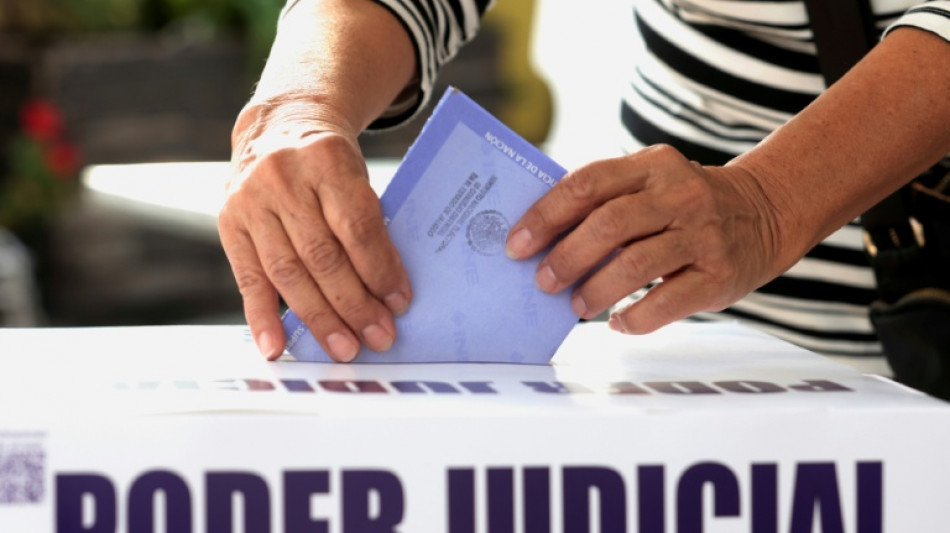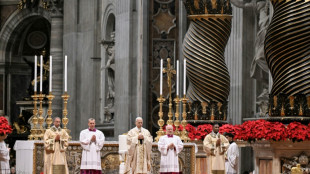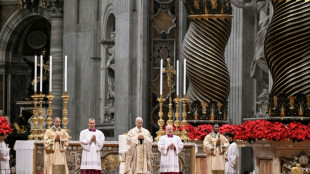
Low turnout marks Mexico's unique vote for judges held under shadow of crime

Mexico's president hailed the country's unprecedented elections for judges a success even though only around 13 percent of eligible voters turned out for a poll that sharply divided opinion.
With Mexico plagued by rampant crime, corruption and impunity, the government and its supporters argued that the reform making Mexico the only country in the world to select all of its judges and magistrates by popular vote was needed to clean up a rotten justice system.
Turnout in Sunday's polls hovered between just 12.57 and 13.32 percent of the nearly 100 million eligible voters, National Electoral Institute head Guadalupe Taddei said in a televised statement.
Despite that low turnout, President Claudia Sheinbaum praised the unique exercise as a "complete success."
"For the first time in history, almost 13 million Mexican women and men exercised their right to decide the new ministers, magistrates and judges," Sheinbaum said in a video message posted to social media.
She insisted on the eve of the vote that only those who "want the regime of corruption and privileges" to continue were against it.
Voters were tasked with selecting around 880 federal judges -- including Supreme Court justices -- as well as hundreds of local judges and magistrates. Another election for the remainder will be held in 2027.
Sheinbaum had defended the judicial reforms but critics feared the elections would politicize the justice system and make it easier for criminals to influence the courts with threats and bribery.
Arturo Giesemann, a 57-year-old retiree, said his main motivation for voting was "the disgust I have with the current judiciary because of its corruption."
Many voters struggled to choose from such a large list of largely unknown candidates.
"We are not very prepared," said Lucia Calderon, a 63-year-old university teacher. "I think we need more information."
In the western state of Jalisco, 63-year-old housewife Maria Estrada said she used her "intuition" because she did not know the candidates.
- 'Easily infiltrated' -
While corruption already exists, "there is reason to believe that elections may be more easily infiltrated by organized crime than other methods of judicial selection," Margaret Satterthwaite, the United Nations special rapporteur on the independence of judges and lawyers, told AFP.
Hundreds of opponents of the reforms marched through Mexico City waving flags and banners with slogans including: "Hands off our democracy" and "No to electoral fraud."
The elections send the judiciary "to its grave," said Ismael Novela, a 58-year-old company worker.
"It was the last counterweight we had against the totalitarianism of the executive branch."
The run-up to the vote was not accompanied by the kind of violence that often targets politicians in Mexico.
However, "it is logical that organized criminal groups would have approached judges and candidates who are important to them," said consultant Luis Carlos Ugalde, a former head of Mexico's electoral commission.
Rights group Defensorxs has identified around 20 candidates it considers "high risk," including Silvia Delgado, a former lawyer for Sinaloa Cartel co-founder Joaquin "El Chapo" Guzman.
Another aspiring judge, in Durango state, spent almost six years in prison in the United States for drug crimes.
- 'Good reputation' -
Candidates were supposed to have a law degree, experience in legal affairs and what is termed "a good reputation," as well as no criminal record in Mexico.
To do a good job, voters "would have to spend hours and hours researching the track record and the profiles of each of the hundreds of candidates," said David Shirk, a professor at the University of San Diego.
He believes that most of the corruption in Mexico's judicial system is in law enforcement agencies and public prosecutors' offices.
"If you can avoid being prosecuted, you don't have to worry about the judge," said Shirk, who heads the Justice in Mexico research project.
The judicial reforms were championed by Sheinbaum's predecessor and mentor Andres Manuel Lopez Obrador, who frequently clashed with the courts before stepping down last year.
The main reason for the elections seems to be "because Lopez Obrador had a grudge against the judges," Shirk said.
B.Michalski--GL

 London
London

 Manchester
Manchester
 Glasgow
Glasgow
 Dublin
Dublin
 Belfast
Belfast
 Washington
Washington
 Denver
Denver
 Atlanta
Atlanta
 Dallas
Dallas
 Houston Texas
Houston Texas
 New Orleans
New Orleans
 El Paso
El Paso
 Phoenix
Phoenix
 Los Angeles
Los Angeles



